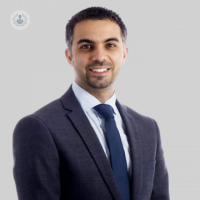What are the most common causes of bladder cancer?
Written in association with:In our latest article, highly experienced and skilled consultant urological surgeon, Mr Ahmed Ali, outlines the main warning signs of bladder cancer, reveals the cure rate, and advises when patients should seek medical attention in relation to symptoms of the cancer.

What are the most common causes of bladder cancer?
Causes are variable but mostly it is cigarette smoke-related. The chemicals in the cigarettes are oncogenic. This means that the materials in these chemicals will change the genes of the normal cell into a cancerous cell.
There are also some other causes that could lead to bladder cancer, such as exposure to rubber, plastics, or exhaust fumes on a regular basis. Then, one of the other main causes of bladder cancer is recurrent infections, especially in people with long-term catheters. Any kind of bladder irritation due to infection could also lead to bladder cancer. These would typically be the main causes.
Does it run in families?
Bladder cancer rarely runs in families, and is usually associated with people being diagnosed with it at quite an early age. I would recommend then, that if bladder cancer runs in the family, patients should seek a medical check-up to confirm or rule it out.
How can bladder cancer be prevented?
It can absolutely be prevented, and indeed, recent studies from cancer research UK have shown that the incidence of bladder cancer has been reducing considerably in the last five years. This is due, at large, to a change in people’s smoking habits. So, the main way to prevent bladder cancer is to reduce the exposure to the causes, such as smoking.
What symptoms warn of possible bladder cancer? When should you see a doctor?
The main warning sign or symptom of bladder cancer is blood in the urine. This is also associated sometimes with the frequent need to urinate, urgency in urination, and also some discomfort and pain while passing urine. If you have any of these symptoms, you should see your GP as soon as possible.
Is bladder cancer curable?
Roughly 80 per cent of bladder cancer cases are presented or diagnosed at an early stage, and the rate of cure is anywhere from 90 to 95 per cent of these cases where the cancer has been diagnosed at an early stage. The cure rate is extremely high.
The cure for bladder cancer is usually associated with a minimally invasive procedure, which we perform using an endoscopic technique. Occasionally, we need to use some form of immunotherapy that we install into the bladder to reduce the risk of progression or recurrence.
Mr Ahmed Ali is a highly esteemed consultant urological surgeon who is an expert when it comes to treating bladder cancer. If you are worried about potential symptoms of bladder cancer, don’t hesitate to book a consultation with Mr Ali today via his Top Doctors profile.


